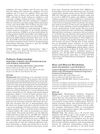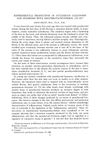 11 citations,
May 2021 in “Journal of Medical Virology”
11 citations,
May 2021 in “Journal of Medical Virology” Men are more likely to have severe respiratory viral infections like COVID-19 due to hormonal and genetic differences, while women generally have stronger immune responses.
 3 citations,
December 2020 in “Endocrine and metabolic science”
3 citations,
December 2020 in “Endocrine and metabolic science” The healthcare for transgender veterans could be better with a more unified team approach.
3 citations,
November 2019 in “Journal of the ASEAN Federation of Endocrine Societies” A 20-year-old woman with a rare form of Turner syndrome showed improvement with hormonal therapy and needs comprehensive care.
 2 citations,
April 2023 in “Pharmaceuticals”
2 citations,
April 2023 in “Pharmaceuticals” Testosterone therapy for postmenopausal women appears safe and may protect against heart disease, but requires constant monitoring and more research for long-term effects.
 October 2023 in “IJEM case reports”
October 2023 in “IJEM case reports” A 15-year-old girl with no menstrual period was diagnosed with a genetic condition that makes her body unable to respond to male hormones, leading to female characteristics despite having male genetic makeup.
 May 2023 in “Journal of Clinical Medicine”
May 2023 in “Journal of Clinical Medicine” New understanding and treatments for hair loss are improving, but more research is needed.
 April 2020 in “Journal of the Endocrine Society”
April 2020 in “Journal of the Endocrine Society” A 14-year-old girl with no menstrual period was diagnosed with Swyer Syndrome and treated for a related cancer risk.
 59 citations,
August 2007 in “Clinical Endocrinology”
59 citations,
August 2007 in “Clinical Endocrinology” The current methods for diagnosing polycystic ovary syndrome are too vague and may lead to misdiagnosis and problems in research.
 52 citations,
October 1999 in “Developmental Dynamics”
52 citations,
October 1999 in “Developmental Dynamics” Mutations in the hairless gene in mice affect its expression and lead to a range of developmental issues in multiple tissues.
 28 citations,
July 2017 in “Journal of Endocrinological Investigation”
28 citations,
July 2017 in “Journal of Endocrinological Investigation” Early onset baldness in men may indicate a condition similar to PCOS, linked to heart disease, diabetes, and prostate issues.
19 citations,
June 2021 in “The world journal of men's health” Using anabolic-androgenic steroids can harm men's reproductive health and increase the risk of heart problems and death.
 18 citations,
April 2013 in “PLOS ONE”
18 citations,
April 2013 in “PLOS ONE” Mice with autoimmune hair loss showed signs of heart problems.
 12 citations,
July 1957 in “Journal of Investigative Dermatology”
12 citations,
July 1957 in “Journal of Investigative Dermatology” Giving dihydrotachysterol to mother rats caused skin hardening and bone issues in their babies through milk.
 1 citations,
August 2012 in “Journal der Deutschen Dermatologischen Gesellschaft”
1 citations,
August 2012 in “Journal der Deutschen Dermatologischen Gesellschaft” A woman's hyperandrogenism was caused by a genetic mutation leading to non-classic adrenogenital syndrome.
 May 2023 in “Animal Reproduction Update”
May 2023 in “Animal Reproduction Update” High levels of cortisol in hair show long-term stress which can lower fertility in animals.
 November 2022 in “Journal of the Endocrine Society”
November 2022 in “Journal of the Endocrine Society” A man's rare adrenal tumor caused feminization and white hair, was removed surgically, and improved after treatment.
 January 2018 in “bioRxiv (Cold Spring Harbor Laboratory)”
January 2018 in “bioRxiv (Cold Spring Harbor Laboratory)” Researchers found key regions in the mouse hairless gene that control its activity in skin and brain cells, affecting hair follicle function.
 14 citations,
September 2017 in “Clinics in Dermatology”
14 citations,
September 2017 in “Clinics in Dermatology” Skin diseases linked to insulin resistance should be managed to prevent diabetes and reduce heart disease risk.
 February 2009 in “Journal of The American Academy of Dermatology”
February 2009 in “Journal of The American Academy of Dermatology” A man with Klinefelter syndrome had a leg ulcer that didn't heal well, even with treatment.
1 citations,
October 2023 in “Animals” Certain DNA regions in alpacas are linked to fiber diameter.
January 2017 in “대한피부과학회지” Minoxidil effectively improved hair loss in a teenage girl with androgenetic alopecia.
 5 citations,
August 2012 in “Journal of Dermatology”
5 citations,
August 2012 in “Journal of Dermatology” Tamoxifen may cause female hair loss by increasing androgen receptor expression.
 2 citations,
May 2019 in “PubMed”
2 citations,
May 2019 in “PubMed” Oral finasteride and dutasteride may negatively affect erectile function in rats.
 April 2020 in “Journal of the Endocrine Society”
April 2020 in “Journal of the Endocrine Society” Non-classic congenital adrenal hyperplasia (NCCAH) can mimic PCOS and requires genetic testing for proper diagnosis and treatment.
 7 citations,
July 1999 in “In Practice”
7 citations,
July 1999 in “In Practice” The conclusion is that a systematic approach is key for treating symmetrical alopecia in dogs, but treatment may not always be necessary.
 6 citations,
September 2010 in “PubMed”
6 citations,
September 2010 in “PubMed” The document concludes that most patients with endocrine disorders experience diffuse, non-scarring hair loss, with scarring hair loss being rare.
 46 citations,
January 1996 in “Journal of The American Academy of Dermatology”
46 citations,
January 1996 in “Journal of The American Academy of Dermatology” People with late-stage HIV-1 often experience a specific type of hair loss linked to multiple factors, including nutritional issues and immune responses.
 4 citations,
January 2000 in “PubMed”
4 citations,
January 2000 in “PubMed” Early balding in men might be a male hormonal equivalent of polycystic ovaries syndrome in women.

Early-onset baldness is linked to genetics, lifestyle, and can indicate higher risk for heart and metabolic diseases, and affects mental health.
 December 2011 in “Korean journal of veterinary research”
December 2011 in “Korean journal of veterinary research” A Miniature Pinscher dog with hair loss and scaling was diagnosed with pattern alopecia and improved with melatonin treatment.

























